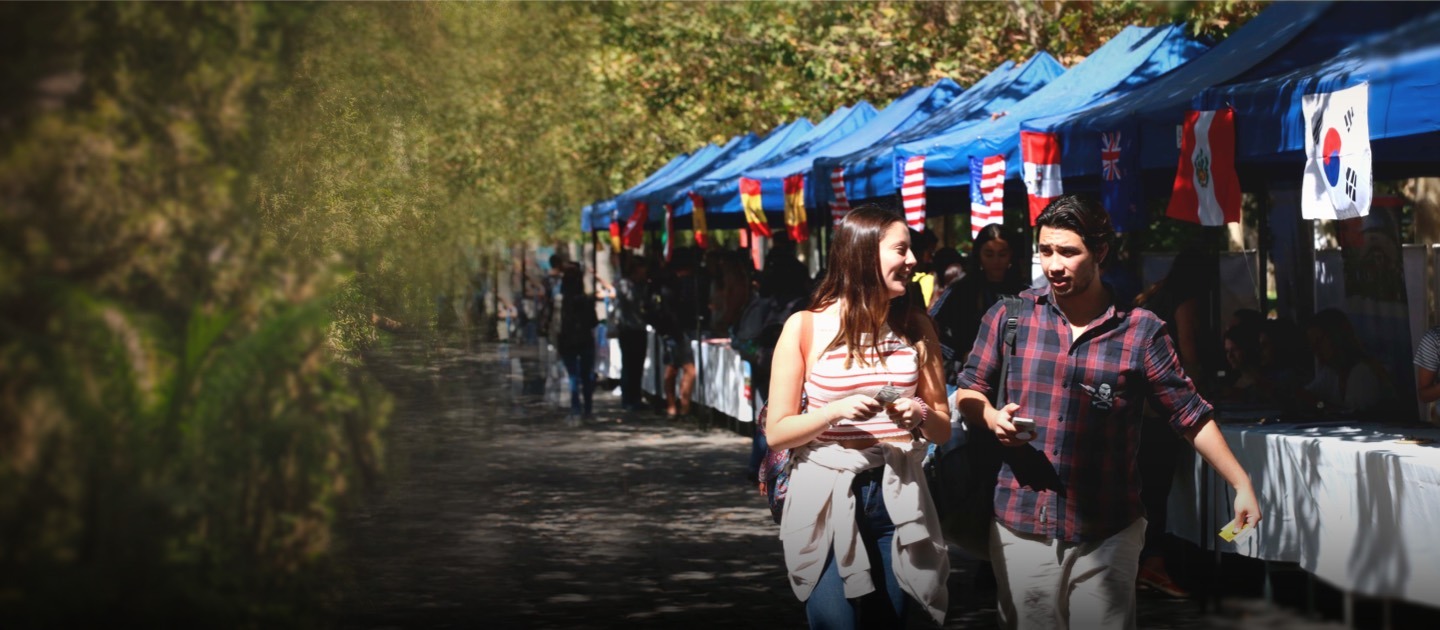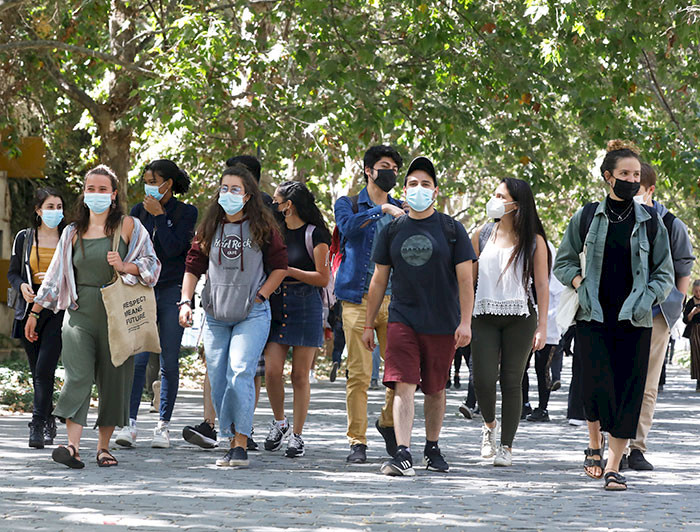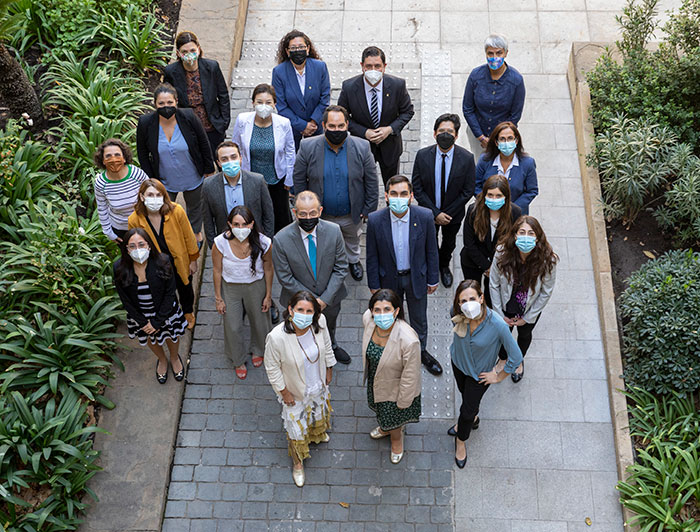
New promising ways to strengthen global relations at UC Chile
Fresh concepts drive the Office of the Vice President for International Affairs, such as "being able to cross borders without leaving the university" or "having a global education mentality". We talked about these topics with Lilian Ferrer, Vice President for International Affairs.

photo_camera Two years ago, the University created the Office of the Vice President for International Affairs to develop a structure that would provide a new perspective on international relations. The focus would be on a more strategic approach to these ties and expanding the UC's links to other regions beyond the English-speaking world. (Photo: César Cortés)
"We need to connect to the world."
That was the motivation that led UC Chile, on May 30, 1980, to sign the first academic exchange agreement with Purdue University in the USA during the presidency of Jorge Swett.
It was the university's first step in opening its doors to the world. Nuria Alsina, a forerunner and promoter of international relations at UC Chile, led this task for several years.
"Over the years, the university signed many agreements to create mobility, mostly for students and some professors," said Lilian Ferrer, current Vice President for International Affairs.
Thanks to this effort, the university now have more than 600 agreements with foreign institutions.
As time went by, the contract number's ceased to be the priority, giving way to optimizing their operation and the results of these partnerships.
Moreover, the concept of Memorandum of Understanding (MOU) or framework agreements, which allow the development of activities in different areas, was expanded.
The need to strengthen research and the internationalization of doctoral programs also emerged. Later this was extended to undergraduate programs to train students to have a global perspective.
Another aspect was to grow international relations with other regions beyond the Northern Hemisphere and English-speaking countries.
A New Vice presidency for a New Approach

Three Institutional Improvement Projects (PMI, Spanish acronym) from the Ministry of Education were crucial to establishing the current Office of the Vice president for International Affairs:
- PUC 1566 focused on the internationalization of research.
- PUC 1866 centered around the internationalization of doctoral programs.
- PUC 1966 aimed at the internationalization of undergraduate programs.
These projects were consistent with the vision of President Ignacio Sánchez. "We needed a structure to support the new approach to internationalization," explained Vice President Ferrer.
The University created the Office of the Vice President for International Affairs (VRAI Spanish acronym) on April 1, 2020. It started as an "adjunct" of the Office of the Provost. Now, two years later, it has taken off on its own.
VRAI begin with a new perspective on international relations. Besides signing agreements, the focus is on achieving strategic international relationships. The purpose is to solve complex problems in today's world, where a single local viewpoint is not enough to tackle them.
"It was a perspective that came from our own identity: to build a better common home, as Pope Francis said," illustrated Vice president Ferrer.
As a result, the university took a very active role in the international networks of which it was already a member:
- leading groups and initiatives in Universitas 21, a network of leading research universities;
- the global network SACRU (Strategic Alliance of Catholic Research Universities);
- and HUC (Hemispheric University Consortium).
It also played a role in national networks. One example is its active participation in the Internationalization committee at the Council of Rectors of Chilean Universities (CRUCH Spanish acronym).
A broader mobility
VRAI has three main axes that articulate all its work:
- Mobility
- Global Education
- Linkage
Let's start with mobility.
This aspect continues to be crucial but under a new definition of the concept—special programs, volunteering experiences, research internships, and service-learning programs for academic exchange.
"Today, young people and researchers are no longer interested in doing traditional internships. Instead, they want to have experiences that allow them to immerse in the culture. To work not only in UC Chile, but also in non-governmental organizations. We also seek to offer research internships to both doctoral and undergraduate students, to those who are interested and want to see how research is done elsewhere," said the vice president.
One challenge has been to include special needs students in mobility programs.
In the second semester of 2022, a group of students with some disability —visual, hearing, motor, or an autism spectrum disorder—for the first time will experience international mobility.
They will go to their academic exchange in partnership with two Spanish universities, while two more institutions will be joining in 2023.
The pandemic also helped to broaden the concept of mobility.
According to Vice President Ferrer:
"We realized that we can cross borders in different ways. It allowed us to have a welcoming attitude, be appreciative, position ourselves in the world, and look for a better way of life globally, beyond personal and local benefit."
The redefinition of mobility was done closely with the Office of the Vice President for Academic Affairs and the academic units:
"More than a hundred people had participated!" enthused Ms Ferrer.
Internationalization at home
All this goes hand in hand with the second pillar: Global Education.
Its key concept is "internationalization at home".
It seeks to expose the entire community to internationalization processes without leaving the country. It is a holistic internationalization logic.
Furthermore, it has involved intensive outreach to the various embassies in Chile as crucial players in the internationalization of the UC Chile campuses.
One result of this outreach is the "Cultural Weeks": VRAI organizes activities several times a year, around different countries, to celebrate its identity and cultural traditions.
In December 2021, the subject was Palestine. This year is Israel's turn, followed by other countries.
Inside the university, there is also an international community —undergraduate and graduate students, professors, professionals, and administrative staff—.
"We need to make a greater effort to integrate them as an international force. Make them truly feel the value they bring to our university," stressed Ms Ferrer.
VRAI created a support program to welcome them better. However, they faced several challenges, such as the pandemic and the change in immigration law, which made it difficult to obtain visas.
"This has involved working closely with the Ministry of Foreign Affairs, the Immigration Department, and consulates outside our country. We want to oversee processes and make it easier for foreigners to come to our university," said the Vice president.
It has also involved working closely with different units within UC Chile, such as the Office of Research, the Graduate School, the Office of Legal Affairs, and the Master's Education Program of the Office of the Vice President for Academic Affaris (VRA Spanish acronym).
"For us, foreign people are a crucial part of our community. UC Chile without foreigners is not the same."
Another line of work is the internationalization of the undergraduate program.
VRAI and VRA are working hand in hand to jointly define the concept of internationalization at home and its concrete steps. First, they wanted to determine the global competencies that students should have: language learning, leadership in other areas, and openness to diversity. The result will be an international leadership program.
One aspect the university seek to promote is "English for Life" so community members are competent in English.
The university is developing workshops for the administrative and professional staff through the English UC Language Center and the Office of Human Resources. They have already completed the initial diagnosis.
Another critical task was adjusting the course validation regulations for UC Chile students who study abroad.
One of the main difficulties they faced, besides financing, was validating the courses they took abroad with their academic curriculum. This problem often caused them to fall behind, but VRAI is in the process of correcting the problem.
Go out and meet the world
The third aspect is Linkage, whose focus has been to promote the university's work in international networks.
"It's a world full of opportunities, but we need to find them and take advantage of them," she said. Internal and external communications strengthen to create international partners and develop a relational strategy with them.
In this area, another relevant aspect is the need to link up with other regions, particularly Asia. For this, UC Chile is working to strengthen the UC Chile Confucius Institute, which seeks to bring Chinese culture closer to Chile and Latin America.
"From our region, we need to find new ways to contribute our value to the global world and learn from our Latin American partners," said Lilian Ferrer.
The university is also seeking closer ties with Oceania and Africa. It already has forged partnerships with Chad and Mozambique.
The great challenge posed by the VRAI to the University is to get out of our comfort zone.
"I believe people need to learn to know and value themselves and build a better world with others. For me, international work is just that: learning to connect, to give value to the networks between people, regardless of where they come from, what they do, or where they are," declared Ms Ferrer.
And she concluded:
"The VRAI seeks to open "doors and windows" so that each community member can go out to meet the world. We want to always contribute to global welfare through global education, collaborative projects, and social commitment."


